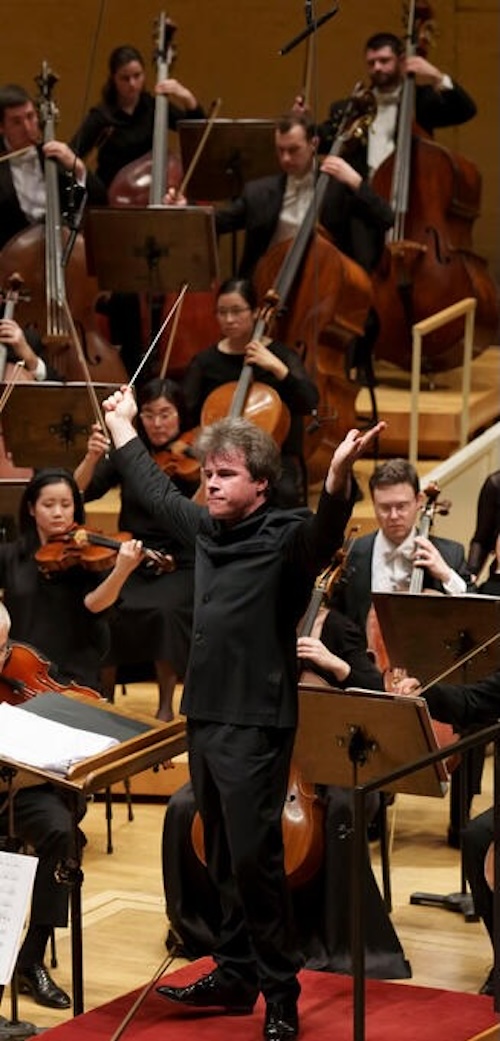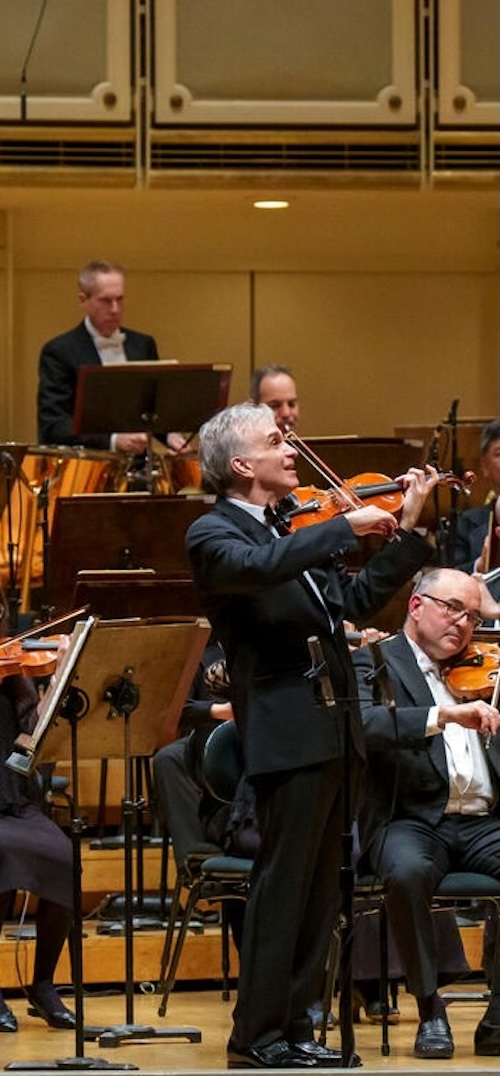Hrůša returns and ignites CSO in music of Strauss, Lutosławski

This week’s concerts by the Chicago Symphony Orchestra launch a significant five-week span that will bring three potential music director candidates to town as podium guests—all superb conductors and popular with both audiences and musicians.
Jakub Hrůša is up first, kicking off his two-week stand with music of Strauss, Mendelssohn and Lutosławski Thursday night at Symphony Center.
While the Czech conductor most recently led the CSO last June in Mahler’s Ninth Symphony, he has not been an unfamiliar face this season. In November, Hrůša directed performances of Janáček’s Jenůfa at Lyric Opera and took the helm for an ailing Daniel Barenboim at the local Staatskapelle Berlin concert.
Hrůša’s two weeks have a certain symmetry, with each program presenting a Strauss tone poem, a violin concerto, and a 20th century showpiece for orchestra.
Richard Strauss’s Death and Transfiguration led off the evening, a work with a venerable local history. CSO founder Theodore Thomas conducted the Chicago debut just a few years after its 1890 premiere, and Strauss himself led the CSO in performances in 1904 and 1921.
Written at age 25, Tod und Verklärung was the first great success in Strauss’s series of orchestral tone poems. The music charts, almost clinically, the final moments of a dying man, both physically—as with the timpani’s faltering heartbeat— and psychologically, as his disordered mind hearkens back to happier days of childhood and youth. After a series of violent death struggles, the protagonist passes, moving into a post-mortal transfiguration, albeit one that in Strauss’s view is more philosophical than religious in nature.
The opening bars were rather literal and lacking in atmosphere Thursday night yet the performance soon found its footing. Hrůša directed an eruptive upsurge for the raging against the dying light, and the ensuing memories were contrasted and vividly characterized, with a gentle innocence in the childhood days and the romantic youth duly ardent and impassioned.
If the horns weren’t ideally blended in the initial statement of the transfiguration motif, Hrůša was at his best in the final section, spaciously charting the rising theme’s ascending waves to a radiant apotheosis.
One does not always think of Witold Lutosławski as an audience crowd-pleaser. But the barn-burning performance of his Concerto for Orchestra proved as thrilling in its fashion as that of any Late Romantic warhorse.
The Concerto for Orchestra (1954) is an early work in Lutosławski’s long career—more traditional in style and not as characteristic or individual as the Polish composer’s more aleatoric and experimental music to come.
That said, the Concerto—scored for Mahler-sized forces— proved a powerful and enormously effective experience as led by Hrůša with full-tilt playing by the orchestra.
This hard-charging score well suits Hrůša’s bold, somewhat emphatic style. From the driving rhythm that opens the first movement and the angular main theme, Hrůša directed a forceful reading with galvanic climaxes and powerful brass attacks (significantly, minus the raucous blare of recent weeks).
The conductor achieved judicious terracing of the massive forces throughout and nicely underlined the subtler aspects of this kaleidoscopic score—the fitful nods to Bartok’s celebrated work of the same title, as well as allowing the fleeting snatches of Polish folksong in the woodwinds to come through. So too, the fast, unsettling “night music” of the second movement was rendered with nuanced dynamics and balancing.
The Passacaglia of the final movement, quietly announced by basses and harps, sets off a series of fifteen variations, in which Scott Hostetler’s plangent English horn solo was a highlight. Hrůša and the CSO musicians ratcheted up the intensity of the Toccata and Chorale finale to a frantic level—Hrůša’s dervish podium style making Georg Solti seem catatonic—en route to an exhilarating and sonorous coda.
It’s always a treat to have Gil Shaham return to CSO, especially after an extended absence of seven years. But with all the violin repertoire out there, why in the world did the CSO program the same Mendelssohn concerto that Shaham played at his last appearance here in 2017?

Still, Mendelssohn’s buoyant concerto fits the popular American violinist like a finely tailored glove—both in terms of Shaham’s sunny temperament, as well as his easy virtuosity and quicksilver charm.
Even in music as familiar as this, Shaham found a way of making Mendelssohn’s concerto emerge as fresh and involving—an unexpected dynamic drop here, slight decelerando to savor a phrase there, or the burst of extra acceleration near the end of the first movement.
The soloist took the Andante at a flowing tempo that skirted sentimentality yet his singing line imbued the lilting main theme with a wonderful guileless purity, ending the movement in a glowing coda. The finale was aptly effervescent with Shaham’s faultless bravura as accurate as it was infectious.
Shaham and Hrůša made companionable colleagues, the conductor supporting his soloist with a vital yet deferential accompaniment that left room for individual touches.
The violinist received a duly enthusiastic ovation and favored the audience with an encore of Scott Wheeler’s Isolation Rag—written for Shaham during the Covid concert shutdown, as he related in a spoken introduction.
Wheeler’s inspiration was that of a violinist practicing alone at home during the enforced isolation. Shaham brought just the right insouciant touch to this libation, a Scott Joplin-like riff alternating with passing glimpses of Bach, Beethoven and the Mendelssohn concerto that Shaham had just performed. Hrůša joined the applause for the encore, seated onstage in an empty harpist chair.
___________
Earlier on Thursday, the CSO announced a $21 million gift from the Negaunee Foundation, one of the largest single donations in CSO history.
The gift will be used to “strengthen the organization’s endowment fund to ensure long term financial stability for the many programs of the CSOA: the Chicago Symphony Orchestra, Civic Orchestra of Chicago, Chicago Symphony Chorus, Negaunee Music Institute and Symphony Center Presents.” The gift also includes operating funds for future concert sponsorships and special artistic projects in the current and upcoming seasons.
“The impact of The Negaunee Foundation’s transformational gift ensures that young musicians and communities in Chicago, around the country and across the world will remain connected to the extraordinary musical and educational resources of the Chicago Symphony Orchestra,” said CSOA president Jeff Alexander in a released statement. “The CSOA expresses its sincere gratitude to The Negaunee Foundation for this exceptional generosity and vision that will sustain our inspiring and effective programs well into the future.”
The program will be repeated 1:30 p.m. Friday and 7:30 p.m. Saturday and Tuesday. cso.org
Posted in Performances






Posted Mar 08, 2024 at 12:55 pm by Brad
Thrilling concert from start to finish. There seems to be a special chemistry between Hrůša and the CSO.
If he’s not chosen as Music Director, I hope they can make him principal guest conductor or some such to formalize the partnership.
Posted Mar 08, 2024 at 8:17 pm by david novak
I disagree with the review. Tod should sing, not be all chopped up (same criticism for the conductor’s Mahler 9). The orchestra did not play as a unit, and the various brass sections often verged on vulgarity.
At 75, I hope for great performances over the next few years. Hrusa will not provide them.
DMN
Posted Mar 09, 2024 at 4:45 am by Andrew Dogan
A phenomenal performance Friday afternoon. The orchestra gives Hrusa all they can and it’s a noticeable difference from some other guests earlier this season.
I sincerely hope he’s under serious consideration for the MD position. I feel like CSO requires the biggest name available, but that Hrusa would serve the orchestra far better.
Posted Mar 09, 2024 at 8:41 pm by Jeff R
The program and performance was fabulous. There’s chemistry between the CSO and Hrusa. A great show compared to most this season. Jarvi excluded… that show was excellent as well.
Posted Mar 09, 2024 at 11:33 pm by Mike T
Great concert on Saturday. The performance of the Lutoslawski especially, was a real wow. Hrusa has real energy and brings out the best in the CSO. I like his programming too. I may have to go see next week’s concert too, to see what he can do with Also Sprach.
Posted Mar 10, 2024 at 6:29 am by Chuck
I hope Jakub Hrůša is the next CSO Music Director. I was at Friday’s concert and it was terrific. I’ve never heard a better live performance of the Strauss. I‘ve been to most or all of the CSO programs conducted by Maestro Hrůša and it’s always been a seriously excellent listening experience. The incredible musical instrument/organism that is the CSO needs/deserves the best.
The concurrently announced and very generous $21 million dollar gift from the Negaunee Foundation to the CSO says a lot about the decision makers at the Negaunee Foundation and the recognition of excellence, breadth and depth of the orchestra and organization — in all its elaborate and rewarding permutations. The orchestra was founded with strong financial support and expectations of the highest musical performance and repertoire standards by both the trustees and first Music Director Theodore Thomas. This continues in 2024 as in 1891.
How fortunate classical music lovers in Chicago (and the world) are for this continuing financial support from both large and small donors. High standards brings their own rewards. Quoting recently deceased philanthropist and businessman Charlie Munger: “The best way to get what you want in life is to deserve what you want. How could it be otherwise?”
Posted Mar 11, 2024 at 1:47 pm by james
I thought that the Friday concert was outstanding, and I agree with the positive comments about Hrusa. I also felt that the bassoon and trumpet playing was great.
Posted Mar 14, 2024 at 3:46 pm by CHARLES CAPWELL
Friday’s concert was indeed memorable. Not a Strauss fan, I did appreciate the Tod etc.; Shaham’s performance of the Mendelssohn was revelatory, and I had to revise my previously lukewarm opinion of the Lutoslavski after Hrusa’s performance–of course, however, I turned to my neighbors and said ‘It takes THIS orchestra to do this!’